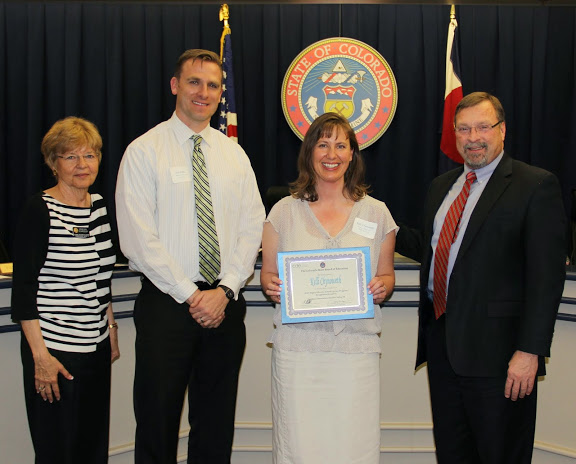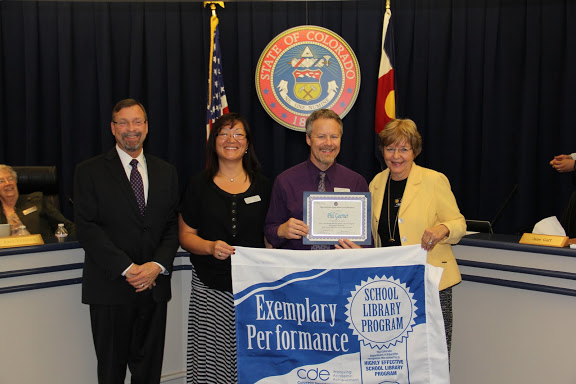Several years ago, a teacher-librarian and her principal stood on the Colorado Department of Education steps reflecting on the ceremony that had just taken place. The annual celebration to recognize Colorado’s Highly Effective School Library Program was a special day for all the award winners, their colleagues, and their families. Naturally, the principal was proud that his teacher-librarian had been recognized by the state board and Commissioner for her accomplishments. He commented to her, “I don’t think I truly understood your job, but after this ceremony, I think I get it.” And he went on to fund another teacher-librarian for this busy and crowded high school library.
We have heard many positive comments and stories about the HESLP program over last three years. Additional feedback from administrators, teacher-librarians, and others within CDE made us reflect that it was time to reboot the entire program this year.
Our first step in the reboot was to revise the HELSP rubric. The feedback we gathered provided us with a clearer vision of the revisions, and we collaboratively created a rubric that:
- can be a tool to encourage collaboration and open dialogue between the administrator and teacher-librarian;
- puts more emphasis on strengths-based leadership;
- is more aligned with current and future-forward practices;
- focuses on student learning and evidence of student growth; and,
- includes more possibilities for innovation.
Powerful partnerships
Administrators play an important role in helping to create effective school library programs. An administrator that recognizes the the power of collaboration and impact that a librarian leader has on student and staff growth is more likely to support that library program.
The new HESLP rubric is designed to foster partnerships and collaborations based on mutual support and ongoing dialogue between teacher-librarians and their administrators. It also encourages partnerships with the school, district, and community-at-large. We encourage administrators and teacher-librarians to complete the HESLP evaluation rubric together in order to get a complete picture of the library program.

ESSA and evaluation support
Because the HESLP rubric gives valuable insight into a school library program, stakeholders can use it to better understand the school library standards embedded in the newly enacted federal law, Every Student Succeeds Act (ESSA).
Additionally, the HESLP evaluation rubric makes a helpful supplement to Colorado’s State Model Evaluation System for Teachers. In Colorado, teacher-librarians are classified and evaluated as teachers. We are finding that numerous administrators use the HESLP rubric as a supplement in the teacher evaluation process.
Student-centric measures
The new HESLP rubric highlights student-centered learning, emphasized in the Colorado Academic and Common Core Standards. Teacher-librarians can use the rubric to identify where they can have a greater impact on student learning. We feel strongly that the effectiveness of any school library program can ultimately be measured by the success of students—that is why the new rubric contains exemplars that can be met by providing student work and evidence of student growth. The most compelling advocacy for teacher-librarians and library programs is when they can show how their teaching and coaching has impacted students and staff, whether through pre/post reflections, a checklist, rubric, or other measurement means.
Changing the conversation
The 2016 HESLP rubric represents a change in thinking about how teacher-librarians and library programs are viewed and valued. This rubric emphasizes teacher leadership and values collaboration among administrators, staff, students and the community—shifting the view from that of a support role to that of a guide for staff and students to transform learning practice. Most importantly, it also opens the conversation for how teachers and teacher-librarians are designing student-centric learning opportunities and collecting evidence of their impact on student learning.
Are there student-centric learning opportunities you’d like to share with us? In what ways have you been collecting evidence of your teaching and how it has resulted in student growth? We’d love to hear from you. And stay tuned this spring for more about the changes to the CDE Recognition Award component of the HESLP Program!

For more information about the Highly Effective School Library Program, contact:
Becky Russell
21st Century Skills Instructional Specialist
E-mail: russell_b@cde.state.co.us
Office: 303.866.6772
Casey Veatch
Digital Literacy Instructional Specialist
E-mail: cveatch@coloradostatelibrary.org
Office: 303.866.6922
- Friday Grab Bag, November 16, 2018 - November 15, 2018
- Friday Grab Bag, November 9, 2018 - November 9, 2018
- Friday Grab Bag, November 2, 2018 - November 2, 2018
